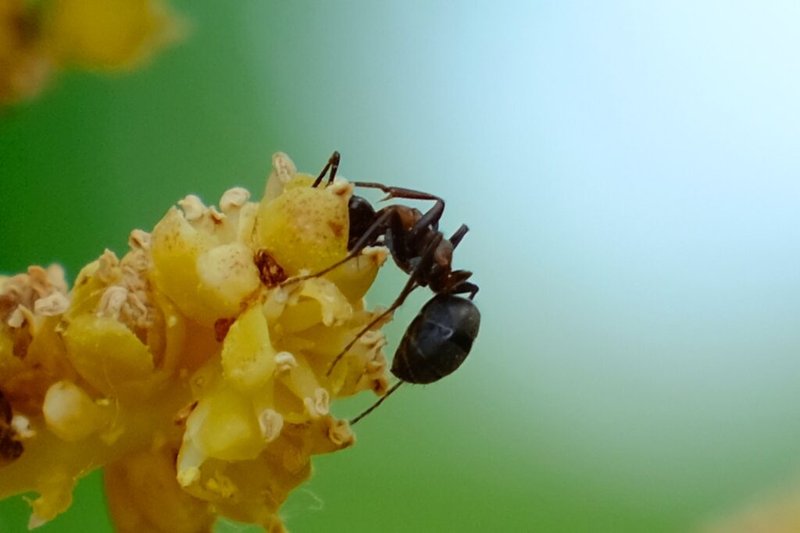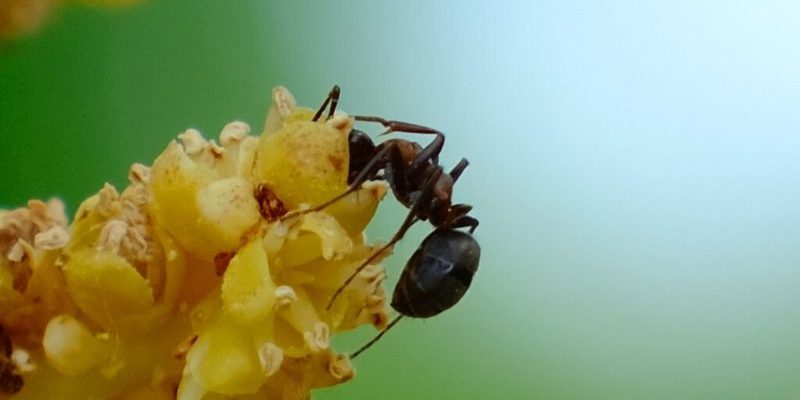
Now, let’s dive into the world of ants and explore their various roles, especially in pollination. Imagine we’re sitting in a cozy café, and I’m sharing some fascinating insights about these tiny but mighty insects. You’ll be surprised at how much work ants do behind the scenes in nature!
Understanding Pollination and Ants’ Role
Pollination is the process where pollen from the male part of a flower moves to the female part, allowing plants to produce seeds and fruit. While we usually think of bees or butterflies doing this job, ants also contribute significantly to this process. Interestingly, some plants even rely on ants to help them pollinate.
These plants have developed relationships with ants, attracting them with sweet nectar or special structures. When ants visit these flowers for a snack, they inadvertently carry pollen from one bloom to another. It’s a win-win situation: ants get food, and plants get pollinated. Who would have thought that such a small creature could have such a big impact on the growth of plants?
Types of Plants That Benefit from Ant Pollination
Certain plants have evolved to take advantage of ants as pollinators. A few examples include:
- Orchids: Some orchid species have flowers that are particularly appealing to ants, thanks to their nectar. Ants help transfer pollen as they move from flower to flower.
- Acacia Trees: These trees offer both food and shelter to ants. In return, ants help pollinate the acacias, ensuring their reproductive success.
- Many tropical plants: In rainforests, numerous species have a mutualistic relationship with ants, relying on their help for pollination.
Because of this partnership, we see how interconnected nature is! Ants play a role that many folks overlook, and it’s a beautiful example of cooperation in the wild.
Ants as Seed Dispersers
Another crucial job that ants perform is seed dispersal. Think of ants as tiny gardeners, helping to spread plant life across various areas. When ants collect seeds, often they’re looking for a tasty treat—a nutritious part of the seed. This behavior is particularly vital for plants that depend on ants for their growth.
Once ants carry these seeds back to their nests, they often store them, sometimes eating the outer layer but leaving the rest intact. This action allows the seeds to take root in new, nutrient-rich locations, giving them a better chance to grow. You might be wondering how this works.
Here’s the thing: many plants have developed seeds with specific nutrients that attract ants. They provide a little snack for the ants while ensuring their seeds are spread wide and far. This relationship helps maintain plant diversity and contribute to healthy ecosystems.
The Impact of Ants on Ecosystems
The work ants do in seed dispersal has a ripple effect throughout their ecosystems. Some benefits include:
- Plant Diversity: Ants help ensure a variety of plants can thrive in an area, which is crucial for maintaining a balanced ecosystem.
- Soil Health: By spreading seeds, ants help to promote new plant growth, which in turn improves soil quality and structure.
- Habitat Creation: The plants that grow as a result of ant dispersal provide food and shelter for countless other creatures, contributing to rich biodiversity.
Without ants performing this job, many plant species would struggle to spread and grow, leading to less diverse habitats.
Ants and Soil Aeration
Let’s talk about another job ants do: soil aeration. As ants dig their tunnels and nests underground, they unintentionally aerate the soil. This means they’re creating tiny channels that allow air, water, and nutrients to penetrate the ground more effectively.
So why is this important? Well, healthy soil is key to healthy plant growth. Plants need oxygen just like we do! When ants create those tunnels, they improve the overall health of the soil, facilitating plant roots to grow and spread.
You might not think about it, but every time an ant digs, it’s helping the environment. Just imagine how much ground they cover with their digging efforts. It’s a pure example of how seemingly small actions can lead to significant benefits in nature.
The Chain Reaction of Ant Activity
Here’s a fun thought: when ants work on aerating the soil, they’re also helping other creatures! As the soil becomes healthier, it attracts more insects and organisms that rely on it for food or habitat. This creates a chain reaction:
- Improved water retention: More porous soil can hold water better, benefiting plants during dry spells.
- Enhanced plant health: As healthier plants grow, they attract more herbivores, which in turn can attract predators, maintaining balance.
- Support for fungi: Ants also help spread mycorrhizal fungi, which help plants absorb nutrients from the soil.
Every little action contributes to a bigger picture in the ecosystem, and ants are right at the center of it.
Ants as Decomposers
Ants are natural recyclers in the environment. They play a crucial role as decomposers. When they come across dead animals or decaying plant matter, they don’t waste any time. Ants break down this organic material, speeding up the decomposition process.
This job is essential for nutrient cycling within ecosystems. By breaking down dead matter, ants help return vital nutrients to the soil, which plants need to grow. It’s a continuous cycle of life—when ants break things down, they’re fueling the growth of new life.
The Benefits of Decomposition by Ants
You might wonder how this affects us beyond the natural world. Here are a few notable benefits:
- Nutrient-Rich Soil: With the nutrients returned to the earth, plants thrive, and in turn, humans can grow food more effectively.
- Cleaner Environment: By consuming dead matter, ants help keep the environment clean, preventing the buildup of waste.
- Habitat for Other Lifeforms: The decomposition process also attracts other species that rely on decaying matter, supporting a diverse ecosystem.
So, the next time you see ants busy at work, remember they’re not just scavenging—they’re helping maintain a cleaner, healthier environment!
Ants might be small, but their impact on ecosystems is immense. From pollination and seed dispersal to soil aeration and decomposition, they work tirelessly to support the environment. By nurturing plants, improving soil health, and recycling nutrients, ants contribute to the balance of nature.
So next time you spot an ant marching along, take a moment to appreciate the hard work they’re doing. They’re more than just tiny pests; they’re essential players in the grand performance of nature. Let’s celebrate these little heroes, understanding how their daily jobs matter in the bigger picture of life on Earth!

